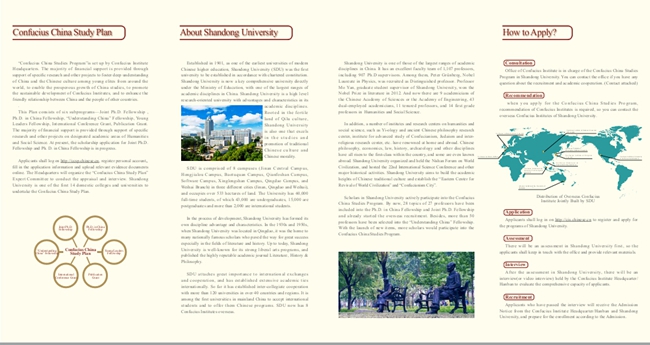
Confucius China Study Plan
"Confucius China Studies Program" is set up by Confucius Institute Headquarters. The majority of financial support is provided through support of specific research and other projects to foster deep understanding of China and the Chinese culture among young elites from around the world, to enable the prosperous growth of China studies, to promote the sustainable development of Confucius Institutes, and to enhance the friendly relationship between China and the people of other countries.
This Plan consists of six subprograms----Joint Ph.D. Fellowship , Ph.D. in China Fellowship, "Understanding China" Fellowship, Young Leaders Fellowship, International Conference Grant, International Conference Sub-program, Publication Grant. The majority of financial support is provided through support of specific research and other projects on designated academic areas of Humanities and Social Science. At present, the scholarship application for Joint Ph.D. Fellowship and Ph. D. in China Fellowship is in progress.
Applicants shall log onhttp://ccsp.chinese.cn, register personal account,, fill in the application information and upload relevant evidence documents online. The Headquarters will organize the "Confucius China Study Plan" Expert Committee to conduct the appraisal and interview. Shandong University is one of the first 14 domestic colleges and universities to undertake the Confucius China Study Plan.
I.Joint Ph.D. Fellowship
II. Ph.D. in China Fellowship
III. "Understanding China" Fellowship
IV. Young Leaders Fellowship
V. International Conference Grant
VI. Publication Grant
About Shandong University
Established in 1901, as one of the earliest universities of modern Chinese higher education, Shandong University (SDU) was the first university to be established in accordance with chartered constitution. Shandong University is now a key comprehensive university directly under the Ministry of Education, with one of the largest ranges of academic disciplines in China. Shandong University is a high level research-oriented university with advantages and characteristics in its academic disciplines. Rooted in the fertile land of Qilu culture, Shandong University is also one that excels in the studies and promotion of traditional Chinese culture and Chinese morality.
SDU is comprised of 8 campuses (Jinan Central Campus, Hongjialou Campus, Baotuquan Campus, Qianfoshan Campus, Software Campus, Xinglongshan Campus, Qingdao Campus, and Weihai Campus) in three different cities (Jinan, Qingdao and Weihai), and occupies over 533 hectares of land. The University has 60,000 full-time students, of which 41,103 are undergraduates, 16,607 are postgraduates and more than 1,813 are international students.
In the process of development, Shandong University has formed its own discipline advantage and characteristics. In the 1930s and 1950s, when Shandong University was located in Qingdao, it was the home to many nationally famous scholars who paved the way for great success especially in the fields of literature and history. Up to today, Shandong University is well-known for its strong liberal arts programs, and published the highly reputable academic journal Literature, History & Philosophy.
SDU attaches great importance to international exchanges and cooperation, and has established extensive academic ties internationally. So far it has established inter-collegiate cooperation with more than 120 universities in over 40 countries and regions. It is among the first universities in mainland China to accept international students and to offer them Chinese programs. SDU now has 8 Confucius Institutes overseas.
Shandong University is one of those of the largest ranges of academic disciplines in China. It has an excellent faculty team of 1,107 professors, including 907 Ph.D supervisors. Among them, Peter Grunberg, Nobel Prize in Physics laureate, was recruited as Distinguished professor. Professor Mo Yan, graduate student supervisor of Shandong University, won the Nobel prize in literature in 2012. And now there are 8 academicians of the Chinese Academy of Sciences or the Academy of Engineering, 43 dual-employed academicians, 11 tenured professors, and 14 first grade professors in Humanities and Social Science.
In addition, a number of institutes and research centers on humanities and social science, such as Yi-ology and ancient Chinese philosophy research center, institute for advanced study of Confucianism, Judaism and inter-religious research center, etc. have renowned at home and abroad. Chinese philosophy, economics, law, history, archaeology and other disciplines have all risen to the first-class within the country, and some are even known abroad. Shandong University organized and held the World Famous Nishan Forum, and hosted the 22nd International Science Conference and other major historical activities. Shandong University aims to build the academic heights of Chinese traditional culture and establish the "Eastern Center for Revival of World Civilization" and "Confucianism City".
Scholars in Shandong University actively participate into the Confucius China Studies Program. By now, 28 topics of 27 professors have been included into the Ph.D. in China Fellowship and Joint Ph.D. Fellowship and already started the overseas recruitment. Besides, more than 50 professors have been selected into the "Understanding China" Fellowship. With the launch of new items, more scholars would participate into the Confucius China Studies Program.
How to apply?
Consultation:Office of Confucius Institute is in charge of the Confucius China Studies Program in Shandong University. You can contact the office if you have any question about the recruitment and academic cooperation. (Contact attached)
Recommendation:when you apply for the Confucius China Studies Program, recommendation of Confucius Institutes is required, so you can contact the overseas Confucius Institutes of Shandong University.( the distribution of overseas Confucius Institutes attached)
Application:Applicants shall log in onhttp://cis.chinese.cnto register and apply for the programs of Shandong University.
Assessment:There will be an assessment in Shandong University first, so the applicants shall keep in touch with the office and provide relevant materials.
Interview:After the assessment in Shandong University, there will be a interview(or video Conferencing) hold by the Confucius Institute Headquarter/Hanban to evaluate the comprehensive capacity of applicants.
Recruitment:Applicants who have passed the interview will receive the Certificate of admission from the Confucius Institute Headquarter/Hanban and Shandong University, and prepare for the enrollment according to the admission.